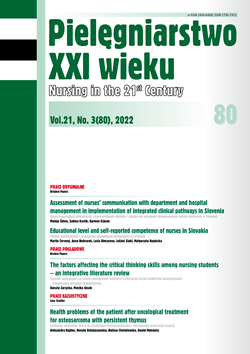Poziom wykształcenia a samoocena kompetencji pielęgniarek na Słowacji
DOI:
https://doi.org/10.2478/pielxxiw-2022-0028Słowa kluczowe:
pielęgniarki , kompetencje, jakość opieki zdrowotnej, Słowacja, samoocenaAbstrakt
POZIOM WYKSZTAŁCENIA A SAMOOCENA KOMPETENCJI PIELĘGNIAREK NA SŁOWACJI
Cel pracy. Celem pracy było zbadanie związku między samooceną kompetencji a poziomem wykształcenia pielęgniarek na Słowacji.
Materiał i metodyka. 73-punktowa Skala Kompetencji Pielęgniarki została przetłumaczona na język słowacki zgodnie z modelem tłumaczenia Brislina, a następnie elektroniczna wersja narzędzia została wysłana pocztą elektroniczną do pielęgniarek w Republice Słowackiej zarejestrowanych w Słowackiej Izbie Pielęgniarek i Położnych. Dane zostały przeanalizowane w programie IBM SPSS w wersji 22 przy użyciu statystyk opisowych, testu t Studenta, testu Kołmogorow-Smirnowa i testu U Manna-Whitneya.
Wyniki. Ankiety wypełniło 135 pielęgniarek pracujących w słowackim systemie opieki zdrowotnej. Pielęgniarki z wykształceniem magisterskim zgłaszały większą pewność siebie w podskalach „zapewnienia jakości” i wyższe kompetencje w podskali „zarządzania sytuacjami” niż pielęgniarki bez tytułu magistra. Badanie to nie wykazało innych istotnych związków między poziomem wykształcenia pielęgniarek a samooceną własnych kompetencji.
Wnioski. Wykształcenie na poziomie magisterskim wpływa na kompetencje pielęgniarskie w zakresie zarządzania sytuacjami klinicznymi i zapewniania jakości opieki pielęgniarskiej świadczonej na Słowacji.
Bibliografia
1. Kajander-Unkuri S, Salminen L, Saarikoski M, et al. Competence areas of nursing students in Europe. Nurse Educ Today. 2013; 33(6): 625-32.
2. European Federation of Nurses Associations. 2015. EFN Guideline for the implementation of Article 31 of the Mutual Recognition of Professional Qualifications Directive 2005/36/EC, amended by Directive 2013/55/EU. Retrieved October 20, 2021 from http://www.efnweb.be/wp-content/uploads/EFN-CompetencyFramework-19-05-2015.pdf
3. Meretoja R, Leino-Kilpi H. Comparison of competence assessments made by nurse managers and practising nurses. J Nurs Manag. 2003; 11(6): 404-9.
4. Intitute of Medicine of the National Academies. 2010. A Summary of the February 2010 Forum on the Future of Nursing. Retrieved October 19, 2021 from https:// www.nap.edu/catalog/12894/a-summary-of-the-february-2010-forum-on-thefuture-of-nursing
5. Wilkinson J, Carryer J, Budge C. Impact of postgraduate education on advanced practice nurse activity – a national survey. Int Nurs Rev. 2018;65(3):417-424.
6. Tóthová V, Sedláková G. Nursing education in the Czech Republic. Nurse Educ Today. 2008;28(1):33-38.
7. Liao L M, Sun X Y, Yu H, et al. The association of nurse educational preparation and patient outcomes: Systematic review and meta-analysis. Nurse Educ Today. 2016;42:9-16.
8. Finn F L, Fensom S A, Chesser-Smyth P. Promoting learning transfer in post registration education: a collaborative approach. Nurse Educ Pract. 2010;10(1):3237.
9. Kilíková M, Hrindová T, Červený M. Az ápolók hatáskörének és jogkörének a szabályozása a szlovákiai egészségügyben [Regulation of nurses’ competence in Slovak health care]. Nővér – A Hungarian Journal of Nursing Theory and Practice. 2019;32(3):32-39.
10. Slovak Chamber of Nurses and Midwives. 2020. Informačný Bulletin [Information Bulletin]. Retrieved October 20, 2021from https://www.SKSaPA.sk/informacnybuletin/bulletin-61.html
11. Meretoja R, Isoaho H, Leino-Kilpi H. Nurse competence scale: development and psychometric testing. J Adv Nurs. 2004;47(2):124-133.
12. Brislin RW. Back-translation for cross cultural research. J Cross Cult Psychol. 1970;1(3):185-216.
13. World Medical Association. World Medical Association Declaration of Helsinki: ethical principles for medical research involving human subjects. JAMA. 2013;310(20):2191-2194.
14. Official Journal of the European Union. 2016. Regulation (EU) 2016/679 of the European Parliament and of the CounciL of 27 April 2016 on the protection of natural persons with regard to the processing of personal data and on the free movement of such data, and repealing Directive 95/46/EC (General Data Protection Regulation). Retrieved October 19, 2021from https://eur-lex.europa.eu/legal-content/EN/TXT/ HTML/?uri=OJ:L:2016:119:FULL&from=EN
15. Sibandze BT, Scafide KN. Among nurses, how does education level impact professional values? A systematic review. Int Nurs Rev. 2018;65(1):65-77, 10.1111/inr.12390
16. Silvennoinen A S, Salanterä S, Meretoja R, Junttila K. Sairaanhoitajan ammatillinen p€atevyys ja siihen yhteydessä olevat tekijät perioperatiivisessa hoitotyössä. Tutkiva Hoitotyoä. 2012;10(3):22-31.
17. Marchetti A, Venturini G, Virgolesi M, et al. Tuning Nursing Educational in an Italian academic context. Nurse Educ Today. 2015;35(9):e19-e25.
18. Kajander-Unkuri S, Koskinen S, Brugnolli A, et al. The level of competence of graduating nursing students in 10 European countries – Comparison between countries. Nurs Open. 2020;8(3): 1048-1062.https://doi.org/10.1002/nop2.712
19. Istomina N, Souminen T, Razbadauskas A, et al. Competence of nurses and factors associated with it. Medicina (Kaunas). 2011;47(4):230-7.
20. Kirca N, Ozgunul Levent M, Bademli K. The relationship between the competence of nurses and their attitudes in medical errors: a cross-sectional survey. J Nurs Manag. 2020;28(5): 1144-1152.
21. Jansson J, Josse Eklund A, Larsson M, et al. Prehospital care nurses’ self reported competence: A cross-sectional study. Int Emerg Nurs. 2020;52:100896,
22. Grešš-Halász B, Majerníková Ľ, Hudáková A, et al. Developing the advanced practice nursing role in Slovakia: Perception, education, and practice. J Am Assoc Nurse Pract. 2021;33(11):916-923.
Pobrania
Opublikowane
Numer
Dział
Licencja
Prawa autorskie (c) 2022 Autorzy

Utwór dostępny jest na licencji Creative Commons Uznanie autorstwa 4.0 Międzynarodowe.




